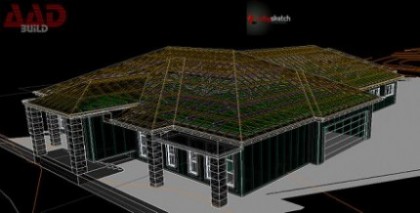The acronym BIM stands for building information modeling. It’s a 3D digital representation of physical and functional characteristics of a building. BIM is also a coordinated set of processes that allow for the creation, management and sharing of the properties throughout the entire lifecycle – before, during and after construction. Its models incorporate operational, graphic, environmental, commercial and physical data. All around, it’s a knowledge resource of information for professionals to make intelligent decisions during the lifecycle of a facility.
The Benefits of BIM
Using BIM data generated during design and construction enables faster and less wasteful construction. All of the coordinated input by project managers aids sustainability in several ways:
- Design changes can be made without time penalties and costs
- With the pooling of manufacturing, construction, technical and operational knowledge, design is value-engineered at every stage of operation and delivery
- All disciplines involved are aware of any changes and can quickly adapt
- Eliminates the need for ad-hoc solutions
- Eliminates waste and rework with the coordination of construction, cost planning, design and production
BIM is a leap forward for ground engineering. It’s always been a challenge to visualize and map what lies underground. BIM makes representing hidden features in a model. Unlike traditional software that connected data points crudely, BIM 3D allows for the geometry between data for geological features like pockets and faults. By enabling annotation of data points in the model, the user get a full view. Specifically, BIM models are more integrated, dynamic and detailed.
The Global Use of BIM
Currently, the United States, New Zealand, Canada, UK and South Korea take the lead with the implementation of BIM. As a matter of fact, a recent initiative of the European Parliament now requests the use of BIM in public construction. BIM is the central theme in the UK’s government construction strategy to reduce carbon and costs. Data collected from Australia, New Zealand, Germany and Japan companies embracing BIM cite three top advantages: reduction in errors, improved collaboration and enhanced organizational image. Almost half reported the main advantage of BIM was the reduction of errors and omissions in the design phase. Thirty-five percent reported the second advantage was improved collaboration with design firms during the construction phase. This fills the gap in communication. Over 30 percent opted for BIM to enhance the company’s image, and it resulted in more and better professional assignments.
What Industries are Embracing BIM
BIM is one of the most recent developments that affects many industries, including the construction, engineering and architecture industries. With more builders and contractors embracing BIM, the days of old-fashioned marked-up drawings and CAD are slowly becoming a thing of the past. BIM has grown in popularity in construction from 28 percent to 71 percent in the last six years. And according to the McGraw-Hill Construction report, more than 50 percent of building companies say that they will be using BIM more broadly in 2015.
Many architects are using BIM to articulate their vision from concept to completion. By optimizing designs for energy efficiency and creating more accurate visualizations for clients with BIM, architects are securing their businesses’ futures. Today, over half of successful architects use BIM. Although the engineering sector has been slow to use BIM, many skeptics are now believers. This is likely due to clients requesting it and the ability to expand into third-party integration consulting and construction management services. Many believe they will be using BIM within the next decade. For many, the future of BIM is already here.


